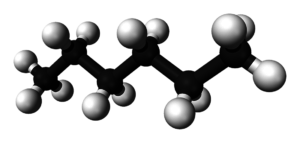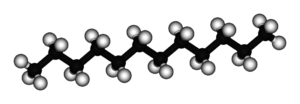Petroleum in cosmetics - What are paraffins and are they harmful?
What are paraffins?
Paraffins are descendants of the crude oil refinery, more precisely the remains of the distillate. You will find applications in all kinds of disciplines. They can be low or high in viscous liquids, such as solids.
What are paraffins in chemistry?

Hexane molecule (black = carbon, white = hydrogen) Fig. 1
Paraffins are mixtures of acyclic (non-cyclic or aromatic) hydrocarbons having the general formula CnH2n + 2. They can be branched chains or unbranched chains, giving them different properties. The C-C and C-H compounds are relatively strong and are protected by most bases and acids, hence the name paraffin, parum affinis (lat.) = Less reactive. Only halogens, e.g. Chlorine just react with them. [1]
What are their properties?

Dodadecane (C-12) molecule Fig. 2
They are cheap because they are made from petroleum waste. They are chemically quite resistant, and non-toxic, which is why they are used in cosmetics as a base for creams, ointments and others, as well as in medicine as absorption inhibitors. They are well flammable, and will therefore be operated in candles, as well as in grill lighters and hybrid rockets with partly solid and partly gaseous fuels [2]. In addition, they are considered to be relatively biodegradable [3].
What is the problem with paraffins in cosmetics?
It is feared that paraffins from a content of 10% contributes to dehydration of the skin and damage the acid mantle. They are said to prevent the skin from performing its own protective functions that promote wrinkles and impede cell metabolism [4]. However, there is no clear evidence for any of these points, which leaves the negative properties of paraffins controversial. Dermatologists tend to be less likely to face problems with the skin due to paraffins [5].
Are there any alternatives, even if paraffins are considered safe?
Yes there is. There are plenty of alternatives in nature, with no negative but many positive qualities. For example, the avocado oil, or the jojoba oil. In addition to their similar properties, they also contain fatty acids, vitamins and minerals, which additionally do the skin good [6]. They moisturize and contribute to a healthy complexion.
–
Sources to read:
Stiftung Warentest about paraffin in cosmetics [5]
Degradability of paraffin by bacteria [3]
Scientific article on Paraffin [1][2]
Properties and general information about Jojoba Oil [6]
Beauty Articles on Paraffins in Cosmetics [4]
Image sources: Wikimedia Commons, Flickr. All image rights go to the owners of the images.




Leave a Reply
Want to join the discussion?Feel free to contribute!